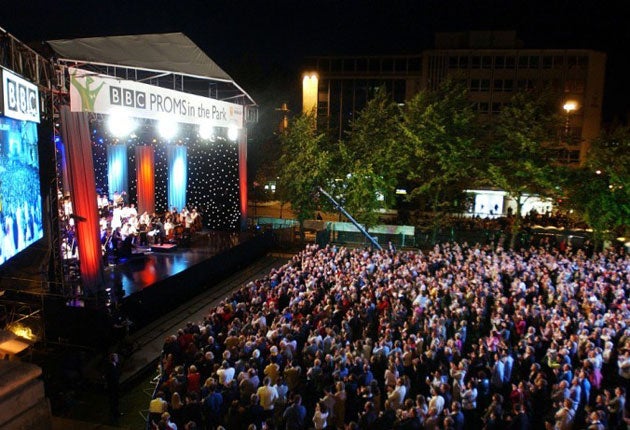Classical musical festivals: an unsung movement
Britain leads the way with classical festivals, says Meurig Bowen, so why do rock events grab all the headlines?

Your support helps us to tell the story
From reproductive rights to climate change to Big Tech, The Independent is on the ground when the story is developing. Whether it's investigating the financials of Elon Musk's pro-Trump PAC or producing our latest documentary, 'The A Word', which shines a light on the American women fighting for reproductive rights, we know how important it is to parse out the facts from the messaging.
At such a critical moment in US history, we need reporters on the ground. Your donation allows us to keep sending journalists to speak to both sides of the story.
The Independent is trusted by Americans across the entire political spectrum. And unlike many other quality news outlets, we choose not to lock Americans out of our reporting and analysis with paywalls. We believe quality journalism should be available to everyone, paid for by those who can afford it.
Your support makes all the difference.Outing oneself as the director of a music festival – but then having to explain it's not one of those festivals, not a Glastonbury or Latitude – is akin, I suspect, to declaring oneself as a lingerie model... but for a thermal underwear catalogue. The glamour factor, in both cases, is quickly re-assessed.
Classical music festivals, in fact, are so apparently unglamorous that they fly well under the radar of "Top 100 Festivals" surveys, which, a quick scan reveals, are really only about that "other" kind of festival.
It can't be the numbers attending each kind of festival that justifies such an imbalance. Per square mile, the UK probably has more classical music festivals than anywhere else in the world. From Orkney and East Neuk to St Endellion, Dartington and King's Lynn, this island's co-ordinates sparkle with out-of-the-way jewels of music-making. Of course, the numbers attending each of them are modest compared with the Readings and Isle of Wights; but add all of the few thousands together, and you have a total of many hundreds of thousands whose festival-going habits get marginalised or ignored.
It's quite possible, then, to see this country's music festival scene as unhealthily schizoid. Outdoors and indoors. Amplified and Unamplified. Commercial and Funded. Pop and Highbrow. Young and Old. Adored by the media, and not.
In reality, it isn't as black and white as that. At a festival like mine in Cheltenham this year there will be music outdoors, music that needs a PA, and a strong sense that it is not off-puttingly highbrow or merely for the bus-pass generation. It can work the other way, too, for artistic planners like me. Alongside the many classical musicians taking advantage of our fine architectural heritage locally, we can bring musicians used to stacks of PA into beautiful acoustic spaces: this year, for example, prog-rock guitarist Robert Fripp performs in Gustav Holst's childhood church, and Norwegian jazz saxophone legend Jan Garbarek will revel in Gloucester Cathedral's five-second reverberation time when he performs there with the Hilliard Ensemble.
There are numerous fresh developments, too, on both sides of this divide which indicate that the barriers are being lowered. Conductor and TV presenter Charles Hazlewood put on an outdoor classical music festival, Play the Field, on his Somerset farm last August. With plans to make it residential next summer – ie, a camping festival – he will be looking closely at how Serenata, a new festival on Dorset's Jurassic coast, and the first to bring the camping, all-in-one-ticket model to classical music, plays out in late August this year.
It isn't just fresh thinking on the classical side of things. There was the headline-grabbing appearance of ENO with some Wagner at Glastonbury a few years ago. And more boutique outdoor festivals such as the Big Chill and Latitude are making some classical forays too – whether classical DJ sets from Gabriel Prokofiev or a new Will Tuckett work from the Royal Opera House.
A new generation of classical musicians is switched-on and savvy about all this. But let us remember that there's quite a lot of people out there – performers and audience – who don't want it any other way than what they've been used to for decades.
So, let's celebrate for one, quiet, un-cool moment, all those music festivals around the land that are really un-cool. Let's hear it for that less-than-fashionable audience member, the back-desk violinists with expanding waistlines and dandruff, the string quartet that arrives for their "gig" in an M-reg Vauxhall. Let's bear in mind the possibility that, for classical musicians focused more on the pre-eminence of the music than considerations of style, there's nothing cooler than not trying to be cool.
Meurig Bowen is director of HSBC Cheltenham Music Festival, 2-17 July ( Cheltenhamfestivals.com/music)
Join our commenting forum
Join thought-provoking conversations, follow other Independent readers and see their replies
Comments